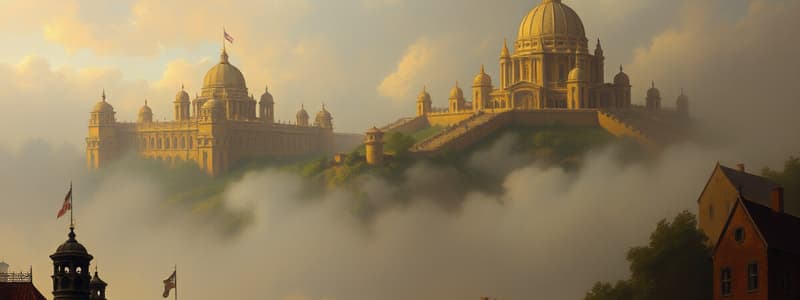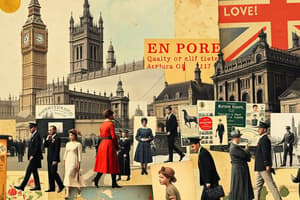Podcast
Questions and Answers
What characterizes an empire?
What characterizes an empire?
- An alliance of independent countries.
- A group of countries sharing equal power.
- A collection of free states under a central government.
- A single country ruling over other countries. (correct)
Which empire was the largest in history at its height?
Which empire was the largest in history at its height?
- Mongol Empire
- Roman Empire
- British Empire (correct)
- Maya Empire
Why was the British Empire able to expand during the late 1500s?
Why was the British Empire able to expand during the late 1500s?
- Advancements in sea travel. (correct)
- Alliances with other empires.
- Discovery of new trade routes.
- Technological advancements in agriculture.
How did the Roman Empire initially begin?
How did the Roman Empire initially begin?
At its peak, how large was the Roman Empire?
At its peak, how large was the Roman Empire?
When did the Maya civilization reach its peak?
When did the Maya civilization reach its peak?
What strategy did the Maya often use to control other tribes?
What strategy did the Maya often use to control other tribes?
Who was the leader that initiated the Mongol Empire's expansion?
Who was the leader that initiated the Mongol Empire's expansion?
Which of the following regions did the Roman Empire NOT encompass?
Which of the following regions did the Roman Empire NOT encompass?
Which empire ruled over the most part of modern-day Mexico and Central America?
Which empire ruled over the most part of modern-day Mexico and Central America?
Flashcards are hidden until you start studying
Study Notes
Empires Overview
- An empire is established when one country exerts control over others.
- Historical empires have influenced global dynamics since ancient times.
British Empire
- Initiated in the late 1500s under Queen Elizabeth I.
- Expansion fueled by advancements in sea travel, leading to exploration and conquest.
- At its peak before World War I, it governed over 400 million people, marking it as the largest empire in history.
- Imposed laws and customs on colonies, often resulting in severe mistreatment of local populations.
Roman Empire
- Originated as a republic ruled by leaders, with Julius Caesar being the last leader before imperial rule.
- At its zenith around 100 CE, stretched from Egypt to Britain, covering an area comparable to the modern United States.
- Lacked advanced transportation, making travel across the vast empire slow and challenging, reliant on basic means like walking and boats.
Maya Civilization
- Flourished between 2600 BCE and 900 CE in Mesoamerica, present-day Mexico, and parts of South America.
- Became most powerful between 250 CE and 900 CE, controlling regions that include modern Mexico, Guatemala, Belize, Honduras, and El Salvador.
- Known for being fierce warriors, often engaging in violence to dominate other tribes and cities.
Mongol Empire
- Emerged in 1206 CE under Genghis Khan, who led a series of expansive military campaigns across Asia and Europe.
Studying That Suits You
Use AI to generate personalized quizzes and flashcards to suit your learning preferences.



